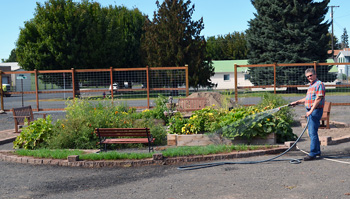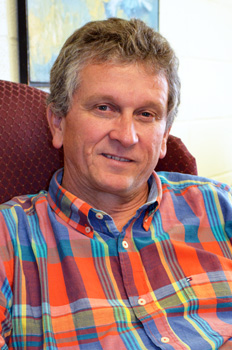Garden is part of a rural ministry of uniting congregations
Eden 99185, a sustainable garden lay people are helping develop beside the Presbyterian campus of Wilbur Uniting Church, is designed to express the abundance of God’s provision in a rural community that is declining as farms consolidate.
 |
|---|
| Roger Hudson helped Wilbur Uniting plant a Jerusalem cross shaped garden in an empty lot. Produce is available outside the church. The Aslan fountain is solar powered. |
With fewer farm families and farm workers, young people are leaving, derelict buildings dot wheat fields and storefronts are empty. The Lutheran and Presbyterian churches have formed Wilbur Uniting Church with two campuses.
The Rev. Roger Hudson, a United Methodist pastor, was appointed two years ago to serve these congregations in the Central Washington community of 800.
The emerging church vision is to create a vibrant church and community, he said.
As in Texas and South Africa, where his commitment to rural ministry was planted and grew, Roger “seeks to find how to minister to the spiritual needs of people and speak to their rural social and economic experiences.”
Eden 99185—the numbers are Wilbur’s zip code—is a symbolic and real tool based on Isaiah 51: “I will transform her dead ground into Eden, her moonscape into the garden of God, a place filled with exuberance and laughter, thankful voices and melodic songs.”
The vision is that the garden will fill the empty, gravel-covered lot with a patio in one corner, where people can gather for coffee and conversation, a playground where children can be exuberant, an orchard and berries in a third corner, and a corner for squash and potatoes.
Members built raised planters in the shape of a Jerusalem cross with pathways to an Aslan fountain at the center. Aslan, the lion in C.S. Lewis’ The Chronicles of Narnia, represents Jesus.
 |
|---|
| Roger Hudson |
Roger made Jerusalem cross-shaped gardens at Community United Methodist in Leavenworth and Manito United Methodist in Spokane.
“The Jerusalem cross is a teaching tool,” he said.
Each quadrant is a raised bed with a cross-shaped planter box of herbs “to add flavor to our potlucks,” he said. “The quadrants represent four disciplines—devotion, compassion, justice and worship—that flavor our walk with God.”
Devotion refers to members doing daily devotions that keep them aware of the link between life and spirituality, Roger said.
Outside semi-circular beds of local crops, such as winter wheat and winter canola, there are meditation benches where people can pause to reflect and pray.
Gathering at the cross, the congregation has blessed seeds when farmers are planting and has held a harvest festival.
“The garden integrates the story of Christ into the agricultural story of the many farmers in the church,” said Roger.
Members express compassion through the food pantry at the Presbyterian campus, supported by Presbyterian, Lutheran, Catholic and Four Square churches.
When it is open one day a month, a community meal is served as an opportunity to build relationships.
Roger said it helps meet needs of some people on food assistance, who move to town for cheap housing. Because there is no work here, many of those people leave when they find jobs.
Wilbur Uniting is one of seven churches in an 18-month training in the Inland Northwest Presbytery to help congregations move into their neighborhoods. The denominations working together in Wilbur all encourage new modes of ecumenical, rural ministries.
“We need to listen to our neighbors, to find where the Holy Spirit is at work and set lay people free to risk in starting new ministries,” he said.
“In a rural context, people have access to the whole community—the doctor, dentist, mayor, retailers and farmers. Experiencing the full picture, they can connect the dots to serve their communities,” said Roger, who seeks to help people discern their calling.
Justice in a small town requires engaging in the community.
Roger joined the Chamber of Commerce, which is reviving Wild Goose Days, named for town founder “Wild Goose” Bill Condit. This summer, the event brought parades, biplanes, sheep dog demos and other events.
“We are building a narrative to market the community. We also have many artists—including a local guitar maker, a flute maker, a wrought iron sculptor and a soap maker,” he said.
“The church needs to be involved, beyond ecclesiastical issues, in the economic and social sides of town, because they relate to spiritual life,” he said. “How can Wilbur Uniting work toward making God’s kingdom real here—through businesses thriving and jobs that strengthen the community.
“How can the church and the community make choices that revitalize both?” Roger asked.
Building a just community means looking at potential assets:
• A two-year construction project to enlarge the powerhouse at Grand Coulee Dam may locate workers in Wilbur.
• With 3,300 cars passing through Wilbur each day, what might lead them to stop? How might the artists have a role in that?
“We need to tell our local story so we don’t become another small dying town. There is much to celebrate in small-town America,” he said.
• How can church people become active in mission? Along with serving in the community, members can engage in global mission opportunities through church channels.
Worship has involved discussion and changes for all.
At first, Roger led an early service at the Lutheran campus and a later service at the Presbyterian campus. Part of the agreement for him to come was that the congregations be open to move toward some kind of unity. So they call their church “Wilbur Uniting Church.”
About 30 attended the Lutheran church and 45, the Presbyterian. By summer, 100 attended. Because summer attendance usually drops, the churches decided to worship together in the summer.
“Relationships formed at the joint services,” Roger said.
In September, the churches voted to continue with one service on alternate campuses, with Sunday school meeting at that campus.
“We celebrate our denominational and theological differences as we experiment with new worship styles to appeal to the younger generation who seek an authentic encounter with the Divine,” he said.
Each month, there’s a Lutheran liturgy and a Presbyterian liturgy, leaving two Sundays free to experiment. Worship is at alternate campuses.
The opening of worship features contemporary songs and a children’s message. Then children go to Sunday school.
“We are feeling our way into a worship style all can accept. All give up something. We continue to engage in much discussion and prayer,” he said.
Roger’s roots in South Africa as the son of a minister in the Methodist Church of Southern Africa contribute to his vision of ministry. After high school, he joined his parents in Dallas, Texas, where his father went in 1975 to study for a doctor of ministries at Perkins School of Theology.
Roger earned a bachelor’s in business in 1982 at the University of Texas, worked in an import-export business and studied computer programming. His master of divinity studies at Perkins included doing a one-year internship in South Africa.
After graduating in 1986, he “cut his teeth in small-town ministry” in Krum, Texas, where he turned around a dysfunctional church, built its attendance from 45 to 120, and was ordained.
Roger, who by then was married to Carla and had two boys, felt called to go back to South Africa to be part of ending apartheid.
When they went in 1989, Nelson Mandela was in prison. Roger ran a lay training institute at a rural mission station in Indaleni. As he tried to play a peacemaking role, he saw many die in violent clashes between African National Congress youth and Inkatha youth allied with South African police.
Not wanting to risk his family’s lives, he went to serve Victoria Methodist Church in East London for five years. There, he became involved in rural development that became a full-time job in rural ministry.
“I integrated Christian spirituality and rural development, linking the liturgical year with agricultural seasons and linking food production with celebrating God’s intent for spiritual and physical health,” he said.
When funding ended, he honored his commitment to Carla to return to the U.S. During their 15 years in South Africa, Mandela was released, and the first democratic elections were held.
Carla, who earned a teaching certificate at Rhodes University, started teaching and witnessed the integration of schools.
When they went to Leavenworth, she taught at a two-room schoolhouse at Plain and he served the Community UMC, helping it grow, improve the building and plant a garden.
Carla earned a master’s and became principal in Wilbur four years ago. Roger began commuting to Manito UMC in Spokane several days a week. When he was in Wilbur, he met members of the Presbyterian and Lutheran churches, which were looking for a pastor. When they asked if he would be pastor for both churches,
Roger began conversing with Lutheran Bishop Martin Wells, Presbytery executive minister Sheryl Kinder Pyle, and United Methodist Inland District Superintendent Dale Cockrum.
Lutherans, who are in full communion with United Methodists, readily recognized his ministry. The Presbyterian Church USA decided to recognize his ministry, too. So the UMC appointed him as pastor.
For information, call 509-647-5402, or email wilburunitingpastor@gmail.com.
Copyright © November 2014 - The Fig Tree




